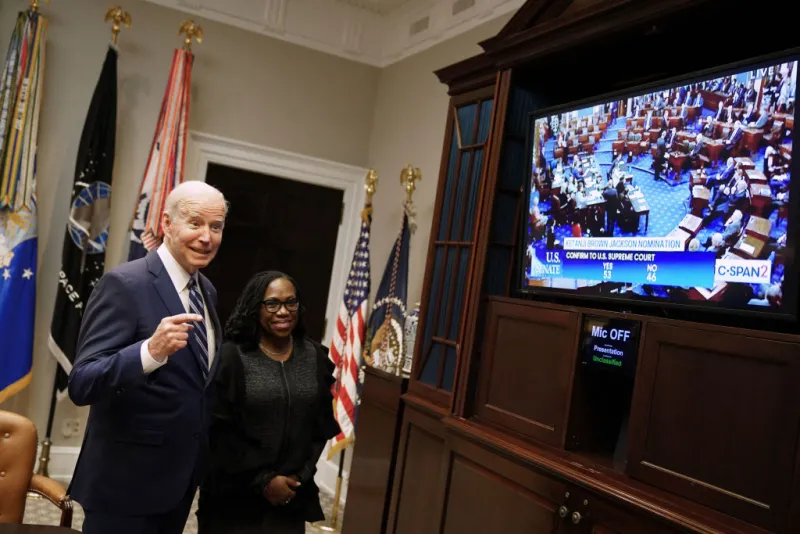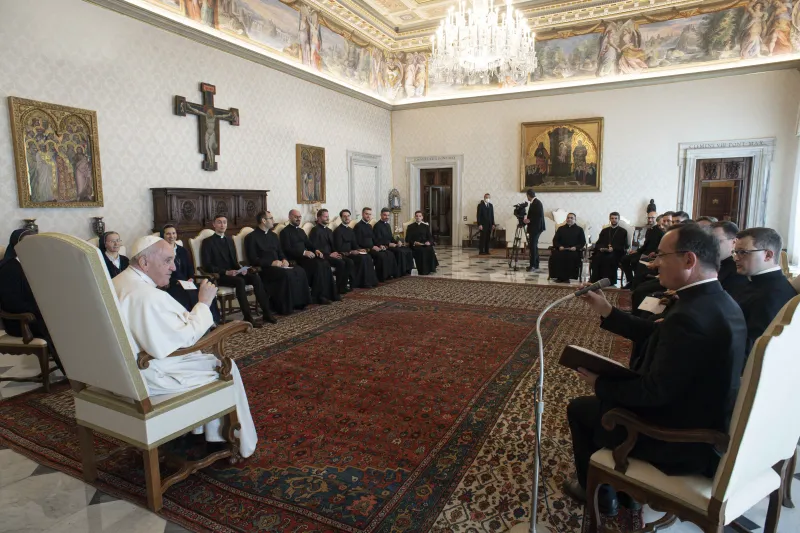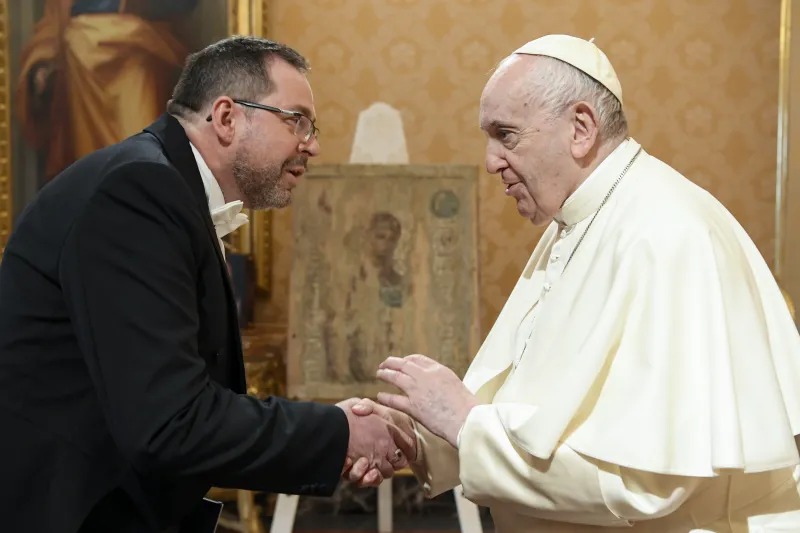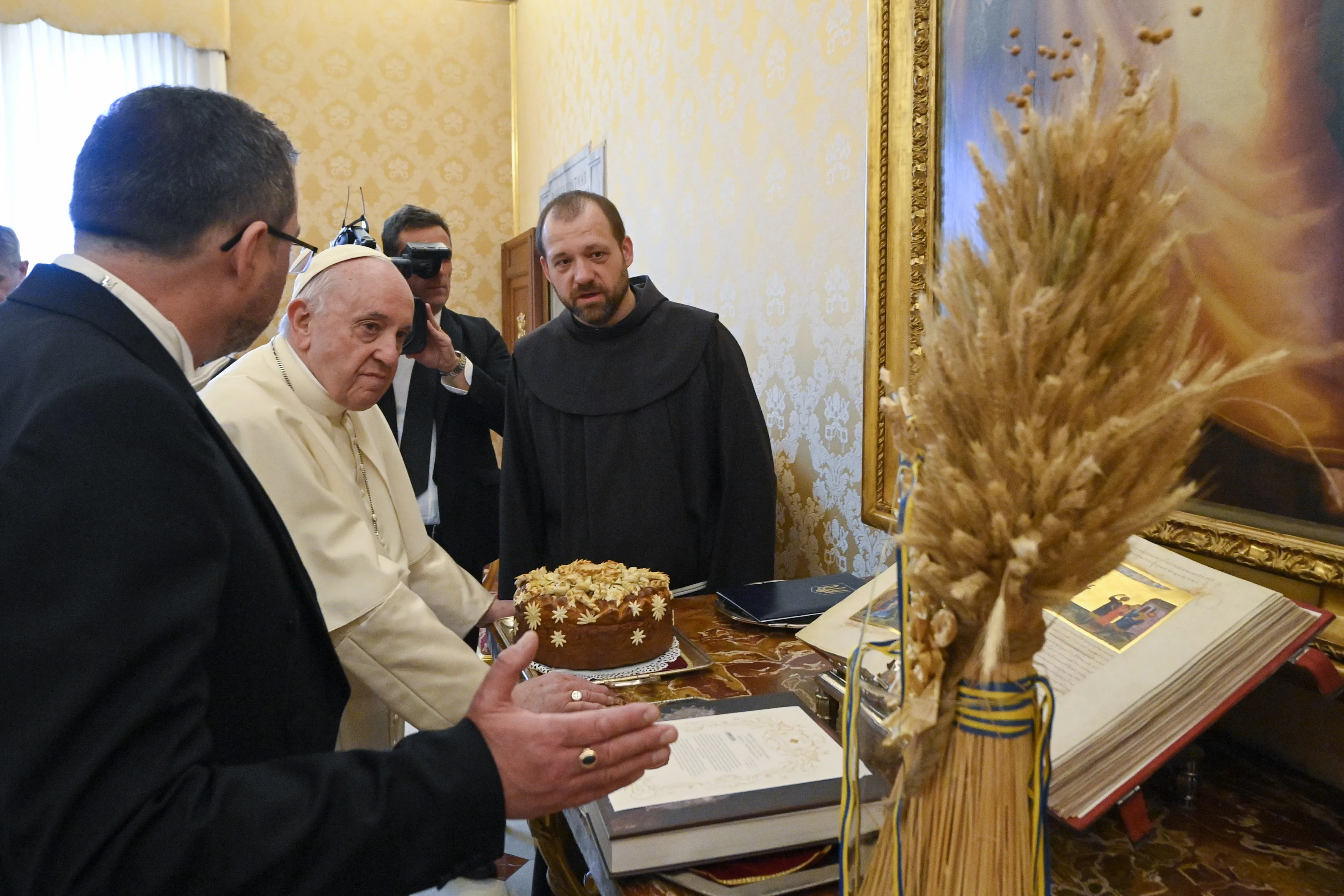 US President Joe Biden and Judge Ketanji Brown Jackson watch the US Senate vote on whether to approve Judge Brown’s appointment to the US Supreme Court in the Roosevelt Room of the White House in Washington, DC, on April 7, 2022. / Mandel Ngan/AFP via Getty Images.
US President Joe Biden and Judge Ketanji Brown Jackson watch the US Senate vote on whether to approve Judge Brown’s appointment to the US Supreme Court in the Roosevelt Room of the White House in Washington, DC, on April 7, 2022. / Mandel Ngan/AFP via Getty Images.
Washington D.C., Apr 7, 2022 / 14:26 pm (CNA).
Ketanji Brown Jackson, a federal judge who also served as a federal public defender and a private practice lawyer, will become the first black woman to sit on the Supreme Court.
The Senate voted 53-47 Thursday to confirm Jackson, President Joe Biden’s pick to succeed Associate Justice Stephen G. Breyer, for whom Jackson once clerked.
Three Republican senators — Susan Collins of Maine, Lisa Murkowski of Alaska, and Mitt Romney of Utah — joined with the Senate’s 50 Democrats to secure Jackson’s confirmation.
Sen. Chuck Schumer, D-New York, the Senate majority leader, said Jackson’s historic confirmation reflected Democrats’ commitment to bring greater diversity to the U.S. judiciary. Biden pledged during his presidential campaign to choose a black woman as his first Supreme Court nominee.
“We certainly have a long way to go on the road to true justice, but by confirming Judge Jackson today, we are taking a bold step forward towards reaching the full realization of our country’s promise,” Schumer said.
“We will make it far more likely that girls across America will feel precisely what Judge Jackson felt herself when she was a kid: Nobody can stop me. I can do this, too. I am brilliant, too. I belong, too.”
Viewed as a progressive, “activist” judge by her conservative critics, Jackson won’t change the ideological balance of the court, where conservatives hold a 6-3 majority.
Nor will she participate in the upcoming Mississippi abortion case, Dobbs v. Jackson, which many abortion opponents see as the best, and possibly last, chance to overturn the landmark 1973 decision Roe v. Wade that legalized abortion nationwide. A decision in Dobbs is expected at the end of June, just before she joins the court.
But at age 51, Jackson could serve on the nation’s highest court for decades to come.
Pro-life opposition
First nominated to a federal judgeship by President Barack Obama, Jackson had few direct dealings with the abortion issue as a U.S. District Court judge for the District of Columbia and an appellate court judge.
But her nomination drew strong opposition from pro-life groups. They pointed to the enthusiastic support her nomination received from Planned Parenthood, the largest abortion provider in the U.S., and a legal brief she co-authored as a private practice lawyer they say denigrated pro-life sidewalk counselors.
“Ketanji Brown Jackson’s confirmation fulfills President Biden’s promise to the abortion lobby and raises the stakes of this year’s critical midterm elections,” Marjorie Dannenfelser, president of the national pro-life group Susan B. Anthony List, said in a statement Thursday.
“As we await a decision in the Dobbs case, momentum is growing nationwide to protect unborn children and their mothers. Americans of all stripes want to modernize our extreme laws that allow abortion on demand up to birth, well after science shows babies in the womb feel pain. More than ever we need pro-life champions in the states and Washington who act on the will of the people and represent their values.”
After several days of questioning Jackson, the Senate Judiciary Committee on Monday deadlocked, 11 to 11, along party lines, on whether to support her nomination. The tie vote made it necessary for the Senate to approve procedural steps to clear the path for a vote by the full Senate Thursday afternoon.
Democrats on the judiciary committee praised Jackson as a distinguished, even-handed jurist whose confirmation as the first black woman Supreme Court justice would mark a historic, inspirational milestone in U.S. history.
Republicans, on the other hand, criticized her for what they saw as her record of judicial activism, and some Republicans maintained that she showed undue leniency in her sentencing of convicted child porn offenders, a charge her supporters denied.
Despite the pro-life opposition Jackson faced, Sen. Joe Manchin of West Virginia, a self-described pro-life Democrat and Catholic, voted in favor of her confirmation.
“Today, I was proud to cast my vote to confirm Judge Ketanji Brown Jackson to serve on the Supreme Court of the United States,” Manchin, a Catholic, said in a statement Thursday.
“Judge Jackson’s record and career are exemplary. She has shown tremendous grace through what has been a difficult confirmation process and has proven without a doubt that she has the temperament and credentials to serve on our nation’s highest court,” he added. “In doing so, she has bravely paved the way so future generations may follow in her footsteps.”
Federal experience
Born in Washington, D.C., Jackson grew up in the Miami area and earned her undergraduate and law degrees from Harvard University, where she was the editor of the Harvard Law Review.
After her clerkship with Breyer, Jackson entered private practice and later served as a federal public defender in Washington, D.C., and vice chair and commissioner for the United States Sentencing Commission, a bi-partisan independent federal agency, prior to becoming a federal judge.
Jackson watched the confirmation vote Thursday with Biden at the White House. They are scheduled to give remarks together Friday afternoon at a White House ceremony.
[…]








